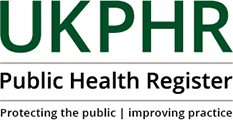Re-registration and revalidation explained…
By David Kidney, UKPHR Executive Director
From time to time I am asked to explain the difference between re-registration and revalidation and how one or both of these processes apply to UKPHR’s registrants.
A little history might be helpful to begin.
The register was set up in 2003 as a regulatory home for public health specialists who were neither doctors nor dentists and so were not eligible for entry on the specialists’ registers of the doctors’ statutory regulator (the General Medical Council) or the dentists’ statutory regulator (the General Dental Council).
We introduced various routes to registration for specialists including completion of the Public Health Specialty Training Programme and retrospective portfolio assessment. Successful applicants were registered by UKPHR for a registration term of 5 years, subject to annual renewal in each of the 5 years.
Every year, every registrant is required to renew her or his registration by making payment of an annual registration fee and making a declaration in relation to their practice, conduct and health. The latter declaration is part of UKPHR’s assurance process in monitoring fitness to practise and promoting improvement in the quality of public health practice.
After 5 years’ registration, all registrants are required to undergo a re-registration process. Considering that this was set up well before the General Medical Council introduced a statutory revalidation scheme for its registrants, I think our founders had considerable foresight in building into the register’s design this 5-yearly check that registrants had maintained their competence after achieving initial registration.
Currently, we still operate this 5-yearly re-registration requirement.
We welcomed the first public health practitioners onto the register in 2011 and they, like specialists, were registered by UKPHR for a registration term of 5 years, subject to annual renewal in each of the 5 years. Accordingly, the first re-registration of practitioners began in 2016 and a number of practitioners have now achieved their first re-registration.
We continue to operate re-registration.
Requirements for re-registration are:
- Production of evidence that the appropriate CPD requirement has been met for the preceding 5 years;
- Production of an annual appraisal (UKPHR does not specify professional or workplace appraisal) that has taken place within 12 months of re-registration;
- Production of a Personal Development Plan (PDP) dated within 12 months of re-registration;
Note the requirement in relation to Continuing Professional Development (CPD). CPD is a mandatory requirement of registration through which UKPHR places an ongoing responsibility on registrants to keep their public health knowledge and practice up to date, thereby maintaining their competence and improving the quality of public health practice.
In the case of the appraisal and the PDP both documents should be signed off by a public health specialist who is registered by the General Dental Council, the General Medical Council (GMC) or UKPHR.
The purpose of re-registration is to conduct a more rigorous check than at each annual renewal so as to monitor fitness to practise and promote improvement in the quality of public health practice.
When the GMC was subsequently required by law to introduce a scheme of revalidation for doctors on its register, UKPHR decided to investigate how it would also introduce revalidation for its registrants. First a working party and later a task & finish group assisted UKPHR in deciding what the required elements of a revalidation scheme should be. UKPHR has also been assisted by many responses it received to two consultations that were part of this investigation. We intend that revalidation will be operated over a 5-year cycle.
As conducted under its statutory duties, the GMC operates revalidation of all its registrants. GMC describes revalidation as the process by which all licensed doctors are required to demonstrate on a regular basis that they are up to date and fit to practise in their chosen field and able to provide a good level of care.
The key difference for UKPHR is that there is no statutory underpinning for its revalidation scheme. UKPHR has now settled proposed terms of revalidation for its registrants, with suitable differentiation of requirements between specialist and practitioner registrants. The next stage in development is for UKPHR’s Board to approve the revalidation scheme and set a timetable for its introduction.
When revalidation is introduced, the 5-yearly re-registration requirement will cease as revalidation will replace it.
A possible timetable from where we are today to when revalidation will have completely replaced re-registration looks like this:
28 February 2017 UKPHR’s Board approves the revalidation scheme
01 March – 31 August 2017 UKPHR raises awareness of revalidation
01 Sep 2017 – 28 Feb 2018 Some registrants due for re-registration volunteer to pilot revalidation instead
01 March 2018 UKPHR evaluates the revalidation scheme’s implementation
Autumn 2018 UKPHR commences a phased introduction of revalidation
A possible phased introduction may involve random selection of a proportion of registrants due for re-registration in 2018, followed by a greater proportion in 2019 and full application of the revalidation requirements in 2020.
As I have shown, UKPHR operates a long-standing and effective registration process incorporating assured competence before initial registration is achieved, renewal and CPD requirements to focus registrants on maintaining their competence post-registration and 5-yearly re-registration to assure the public and employers of the system’s rigour.
In time, but not immediately, revalidation will be introduced and will represent an enhancement of our current 5-yearly re-registration process, and will replace re-registration. Our revalidation requirements will be widely and frequently communicated during the period we have set aside for awareness-raising.
I hope that readers find this information helpful. You are welcome to contact me if you have any comments or questions about my explanation.



Comments are closed.